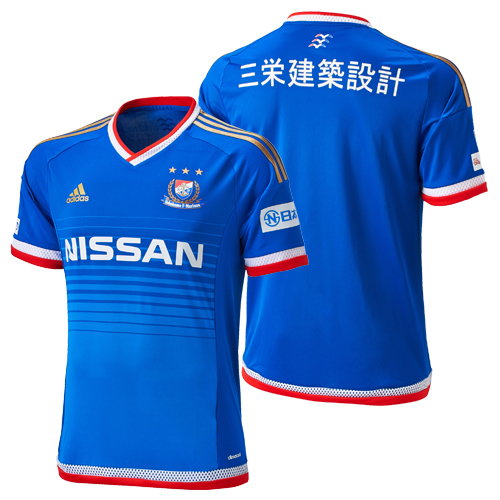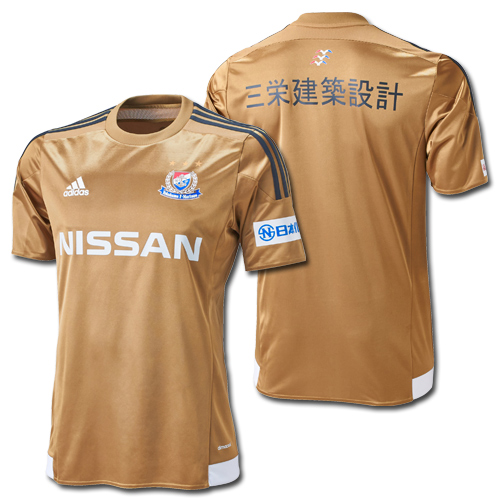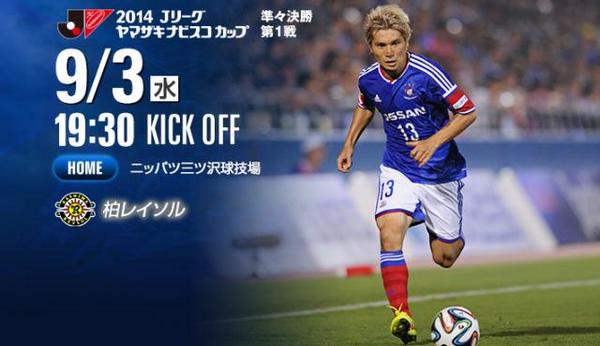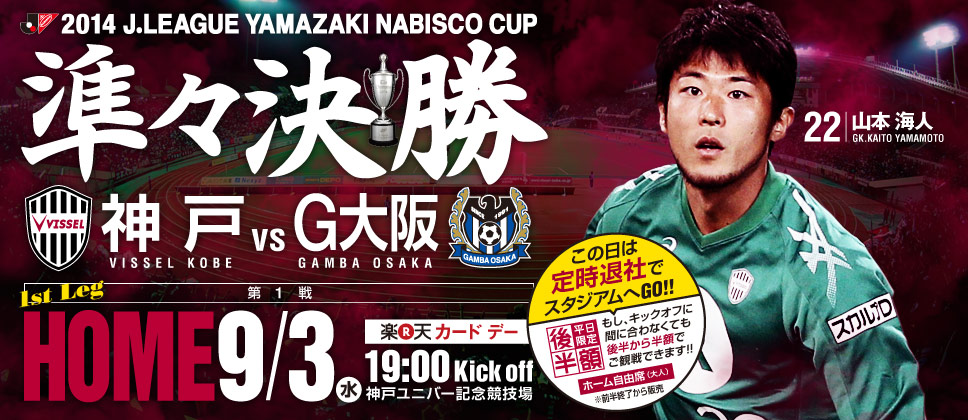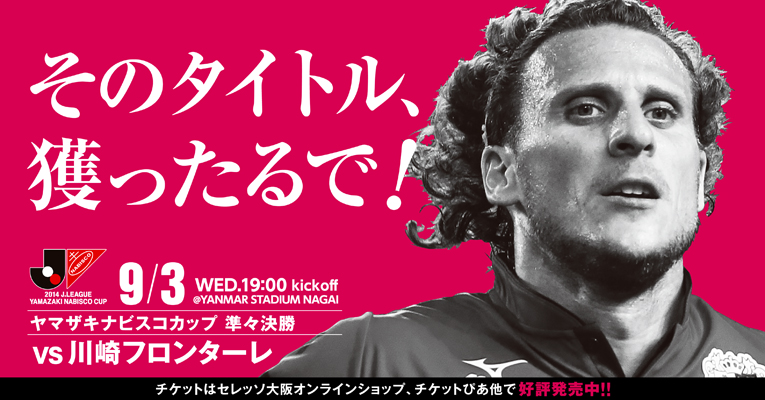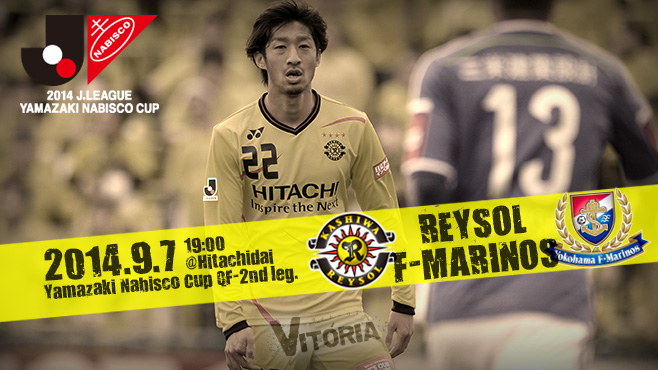Tag Archives: Yokohama F•Marinos
Naoki Matsuda
Here’s the text with that video … August 4th, 2011, RIP Naoki Matsuda
Former Japan international defender Naoki Matsuda died on Thursday, two days after collapsing with a heart attack during training, leaving the country’s football community in mourning.
His death aged 34 was announced by his club Matsumoto Yamaga of the Japan Football League, the third-tier division, where he moved this year after 16 years at J-League first-division side Yokohama Marinos.
Matsuda fell into a coma after a warm-up run on Tuesday morning. He was rushed to hospital, where he was put on life support.
Fans, along with past and present team-mates, flocked to the hospital in the mountain city of Matsumoto, 180 kilometres (110 miles) northwest of Tokyo, as Matsuda fought for his life.
His death came just over two weeks after Japan’s women’s team won the World Cup for the first time.
“I never got to know Matsuda directly but knew what a great player he was having watched him in the J.League last year,” Japan coach Alberto Zaccheroni said, according to Kyodo news agency.
Matsuda, known as a gutsy player and valued for his 183-centimetre (six foot) height, was capped 40 times. He played all four of Japan’s matches at the 2002 World Cup, when the Blue Samurai reached the last 16 at home. But his international career ended in 2005 when he fell out with then national coach and Brazilian legend Zico.
Matsuda said in his farewell speech to Yokohama fans in December that he lived for the game. “Seriously, I love football for the heck of it,” he said.
… and another worth your time:
Yokohama F•Marinos 2015 Season Preview
by @tgR_tsuru
By far the most significant change at the club over the winter took place off the field, when the club announced that manager Yasuhiro Higuchi was standing down. His three seasons at the helm saw mixed results – memorable was the high of an Emperor’s Cup win, of course. Higuchi finished his stint with a respectable 45 wins, 31 draws and 26 losses to his name.
So, in comes 59 year-old Frenchman Erick Mombaerts, with something of a mixed record. In addition to bringing in a more positive, proactive brand of football and managing generational change in the F•Marinos squad, Mombaerts must navigate the challenges inherent in working in a different culture, both on and off the field.
On the transfer scene, F•Marinos have been very quiet in the off -season compared to other J.League clubs. One absence that will be particularly felt is that of Shohei Ogura, who left for Gamba Osaka. The aggressive central midfielder had been unfortunate with injury over the last three seasons, but marked his return to the starting eleven last year with some superb performances, particularly in the period from July through September.
Incoming? Well, with rumors of F•Marinos old boy #194cmHavenaarMike returning to the nest having come to nothing, the club’s player recruitment for the 2015 J1 League amounts to a high school student, a university student, and a youth
team goalkeeper. That is it!
The youth team goalkeeper, Junto Taguchi, replaces Rokutan as F•Marinos’ number three keeper. Teruhito Nakagawa, graduated from Senshu University in Tokyo as the number one ranked university-level striker in Japan last year. Standing at only 1.61m, Nakagawa is small, and known for his dribbling in addition to his finishing in front of goal. Currently in rehabilitation for an anterior cruciate ligament injury, he is unlikely to figure in team plans
in the first half of the 2015 season.
High school student, Kensei Nakashima, is another ‘number one ranked’ player in his age group, the Under-18 Japan representative being accorded the ‘number one high school playmaker’ moniker. We saw some of his ability for Higashi Fukuoka in the All-Japan High School Soccer Tournament over the Christmas and New Year period. With an eye for a pass, quick feet and a touch of audacity, many are hoping that he will prove to be ‘the next Shunsuke’.
If Rafinha can manage a full season and be among the goals, and if Manabu Saito fi nds the form that saw him selected for Japan’s World Cup squad, F•Marinos have the talent to once more contest for a place in the top five. Whether it comes together
or not remains to be seen.
Having said that, the reluctance over the past two off -seasons of F•Marinos to spend money on the squad, no doubt linked to concerns that the J.League would revoke the club’s license, may well
come back to haunt them. If the gamble of a foreign manager at this critical juncture doesn’t pay off and Mombaerts fails to adjust to the local culture, and the squad fails to adjust to his methods and requirements a troubled season is in store.
Comment on the “Racism” Incident at F•Marinos v Frontale
On Recent Events…
by jamiemc60
Despite a return to form on the pitch in recent weeks, it’s off the field issues that have earned the headlines for our beloved club in recent weeks. Of course, as a football fan it’s never nice to see your club on the front pages rather than the back pages, but as a foreign supporters group the challenges we have faced in recent weeks have been particularly concerning. As such, we feel it is appropriate to both inform our readers and offer an opinion on recent events. This post will be separated into two parts. In part 1, for those who have not yet learned of the incident in question, we will explain exactly what has happened and the circumstances around it. In part 2 we will offer our opinion on events.
Part 1
Firstly, we would like to note that the club or the fans of our regional rivals Kawasaki Frontale were in no way to blame for recent events, but we do feel it’s appropriate to put into context the rivalry between our clubs.
In recent years, ties against Frontale have become increasingly heated. In December of last year, Kawasaki defeated us on the final day of the season to deny us our first league championship in a decade. In May, we returned to Todoroki, the home of Frontale to face them in the final J.League fixture before the league took a two month break for the World Cup. At this game, a Frontale fan laid a scarf over a banner of club legend Naoki Matsuda, which had been positioned in front of the home fans due to a large traveling support. This act prompted a furious response from our fans, who moved towards the home fans and demanded the scarf be removed immediately.
In most other leagues, such actions in a local rivalry would be standard fare. As I write this article from Glasgow, Scotland, such an incident at a local derby wouldn’t gather a single line in a newspaper, with players, fans, managers and even politicians wading into the inevitable controversy that surrounds each Celtic and Rangers game that takes place. However, context is important here, and the J.League is not a league that has suffered from hooliganism or misbehaviour from fans in its 20 year history. The matchday experience of fans in Japan is second to none. Stadiums are family-friendly, alcohol is readily available at reasonable cost inside the stadium, and there is little restriction on what fans can bring into the stadium overall. This tremendous match day experience comes at a cost; with the league and clubs’ sensitivity to public relations serving to sanitise the experience of fans who want to participate in ‘banter’ or to poke fun at their rivals. Acts seen as stoking rivalry are frowned upon and deemed ‘provocation’. For example, after Shimizu S-Pulse fans teased their relegation-doomed local rivals Jubilo Iwata in the Shizuoka Derby last year, the club reacted by banning songs and banners whilst the players were not on the pitch, as well as prohibiting them from ‘over-celebrating’ victories.
In March of this year, Urawa Reds, one of the most popular clubs in Japan, were forced to play a home game behind closed doors after fans displayed a banner reading ‘Japanese Only’ at the entrance to the section behind the goal. The Saitama stadium was closed for their home game against S-Pulse, and J.League president Mitsuru Mirai accused the club of “damaging the brand of not just the J.League, but of the entire Japanese football community.” Whilst instances of racism have occurred sporadically in the league in the past, this incident almost went viral. Images of the banner appeared on Twitter, international news outlets such as the BBC and Eurosport covered the story and the response of fans in the league was almost unanimous: racism would not be tolerated in the J.League. The supporters group responsible for the banner was disbanded, and the president of the club apologised for the incident and the slow response of club officials who had bizarrely waited to seek permission from the owner of the banner before removing it from the stadium. Yokohama F•Marinos fans, for their part, spoke out against racism at their next match. Fans Tweeted us pictures of banners they had created and put them out for display at the next available opportunity.
Six months on from these events, and Kawasaki Frontale were back in town. Due to Nissan stadium playing host to a national school sports event, the tie was to be held at Mitsuzawa, our second stadium with an attendance of around 16000. If recent ties held at the larger Nissan stadium are anything to go by, this game could have sold-out twice over. Fans packed in to the venue and a full-stadium ‘tifo’ display reading ‘YOKOHAMA’ was displayed prior to kick-off. The match was a heated affair, with Kawasaki having a man sent off in the first half. Throughout the match tensions ran high and the Kawasaki players were relentlessly booed when they took possession and as they approached the corners. Our new boy Rafinha was lucky to stay on the field after apparently shoving the referee out of the way in an attempt to get to Frontale defender Jeci after a poor tackle from the Brazilian. The game finished with a 2-0 victory, our second win over our rivals this year and one of our best performances so far this season. As the dust settled, however, our performance on the field would be overshadowed by the actions of a fan in the stands.
Similarly to the Urawa incident in February, videos and images began to circulate on Twitter shortly after the match showing a Yokohama F•Marinos supporter waving a banana at Frontale’s Brazilian attacker Renato.
With club officials viewing the incident, swift action was taken. The perpetrator was taken aside after the game and asked to explain himself. Whilst he denied his actions were racist, the club took the decision to ban him indefinitely. President Kaetsu described the incident as, “Unforgivable”, and even took the step of apologising profusely for the incident.
After several days deliberating, the J.League handed down a punishment to the club, a fine of 5 million yen. League President Mitsui Murai declared that, “The club dealt with the case appropriately but we did not feel they were doing enough to raise awareness, as is their responsibility.” As such, at the weekend following the incident when we faced Vegalta Sendai, there were no drums, no ultras and no banners. Fans will participate in anti-racism educational events before taking their place behind the goal once more. The particular supporters group that the perpetrator was a member of (easily identified by their distinctive black shirts) have been disbanded and will not be welcome at any of the remaining matches this season. The club has also asked for a general toning down of the booing during player announcements of visiting clubs, and in particular a cooling down of provocative acts towards Kawasaki Frontale on social media.
Part 2
We at Tricolore Pride are deeply disappointed with the racist incident that took place at Mitsuzawa recently. We fully accept the decision of the J.League to punish the club in this instance, however we feel we are in as good a position as anyone to offer an insight in to the Yokohama F•Marinos support on this particular issue.
Whilst there were Tricolore Pride members attending the game on that particular evening, none of us were in the vicinity of the incident that took place. Aside from the racist actions of the individual himself, those sitting in the immediate area surrounding him must also accept some responsibility. Self-policing is an important part of any event in which large groups amass. The failure of those around the perpetrator to intervene is of great disappointment.
Only the perpetrator himself truly knows his opinion on racism, however it is obvious that he did not have the sense to know that such a provocative act was not a legitimate way to act at a football match. Education is the key in eradicating racism from both football and society as a whole. It is easy to simply throw a fine at a club and move on, but we commend the J.League for recognising this is not a long-term solution and for indicating a desire to see anti-racism training carried out by fans. We would hope that the fan in question grows to learn from his mistakes and will eventually see the error of his ways.
In the past year alone, we have hosted guests from the following nations at home games: India, the Netherlands, Zambia, Australia, Canada, Scotland, Tunisia, the Philippines, Italy and England. In that time, we have never received anything other than a warm welcome from, what we believe, are the best fans in the country. Fan group leaders have reached out to us, we have been given gifts, shared beers with and chanted alongside many fans. In our experience, race is inconsequential; when you don your jersey, you’re a Yokohama F•Marinos fan and nothing else.
On September 13th, we will face Nagoya Grampus at the Nissan Stadium. On that day, most of the Tricolore Pride blog members will be in the stadium, with Tony and Jamie flying in from Australia and Scotland respectively to see the team play. Yokohama F•Marinos truly are an international club, and, as our success on the field and popularity increases, our fan base is becoming increasingly international in turn. We will continue to encourage friends & guests from all over the world to attend home matches with us, without fear of racism or discrimination in any form.
Please join us in supporting the team to another victory against Nagoya Grampus.
We are Marinos.
Tricolore Pride
Yokohama F•Marinos 1-2 Kashiwa Reysol Nabisco Cup
Nabisco Cup quarter final 1st leg
Yokohama F•Marinos 1-2 Kashiwa Reysol
ナビスコカップ 2014 準々決勝 第1戦 横浜Fマリノス-柏レイソル
J.League Yamazaki Nabisco Cup Quarter FInal results …
1st Leg: Wednesday Sept.3
Cerezo Osaka 1-3 Kawasaki Frontale
Vissel Kobe 1-1 Gamba Osaka
Sanfrecce Hiroshima 0-0 Urawa Reds
Yokohama F•Marinos 1-2 Kashiwa Reysol
2nd Leg: Sunday Sept.7
18.00 Urawa Reds v Sanfrecce Hiroshima at Saitama
18.00 Gamba Osaka v Kobe at Banpaku
19.00 Kashiwa Reysol v Yokohama F•Marinos at Kashiwa
19.00 Kawasaki Frontale v Cerezo Osaka at Todoroki
2014 Nabisco League Cup Final Tournament Quarter-Finals
2014 J.League Yamazaki Nabisco Cup Quarter-Finals
1st Leg: Wednesday Sept.3
19.00 Cerezo Osaka v Kawasaki Frontale at Yanmar Nagai
19.00 Vissel Kobe v Gamba Osaka at Universiade
19.00 Sanfrecce Hiroshima v Urawa Reds at Edion
19.30 Yokohama F•Marinos v Kashiwa Reysol at Mitsuzawa
2nd Leg: Sunday Sept.7
18.00 Urawa Reds v Sanfrecce Hiroshima at Saitama
18.00 Gamba Osaka v Kobe at Banpaku
19.00 Kashiwa Reysol v Yokohama F•Marinos at Kashiwa
19.00 Kawasaki Frontale v Cerezo Osaka at Todoroki
and some of the ads…
